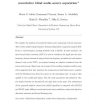Free Online Productivity Tools
i2Speak
i2Symbol
i2OCR
iTex2Img
iWeb2Print
iWeb2Shot
i2Type
iPdf2Split
iPdf2Merge
i2Bopomofo
i2Arabic
i2Style
i2Image
i2PDF
iLatex2Rtf
Sci2ools
110
click to vote
IJON
2008
2008
An adaptive stereo basis method for convolutive blind audio source separation
We consider the problem of convolutive blind source separation of stereo mixtures. This is often tackled using frequency-domain independent component analysis (FDICA), or time-frequency masking methods such as DUET. In these methods, the short-term Fourier transform (STFT) is used to transform the signal into the timefrequency domain. Instead of using a fixed time-frequency transform on each mixture channel, such as the STFT, we propose learning an adaptive transform from the stereo mixture pair. Many basis vector pairs of the resulting transform exhibit properties suggesting that they represent the components of individual sources, together with the filtering process from the sources to the microphone pair. A mask is then applied to the transformed signal, with the mask parameters determined by relative delays between the learned left and right basis vector pairs. The performance of the proposed adaptive stereo basis (ASB) algorithm is compared with FD-ICA and DUET under different re...
Related Content
| Added | 12 Dec 2010 |
| Updated | 12 Dec 2010 |
| Type | Journal |
| Year | 2008 |
| Where | IJON |
| Authors | Maria G. Jafari, Emmanuel Vincent, Samer A. Abdallah, Mark D. Plumbley, Mike E. Davies |
Comments (0)

